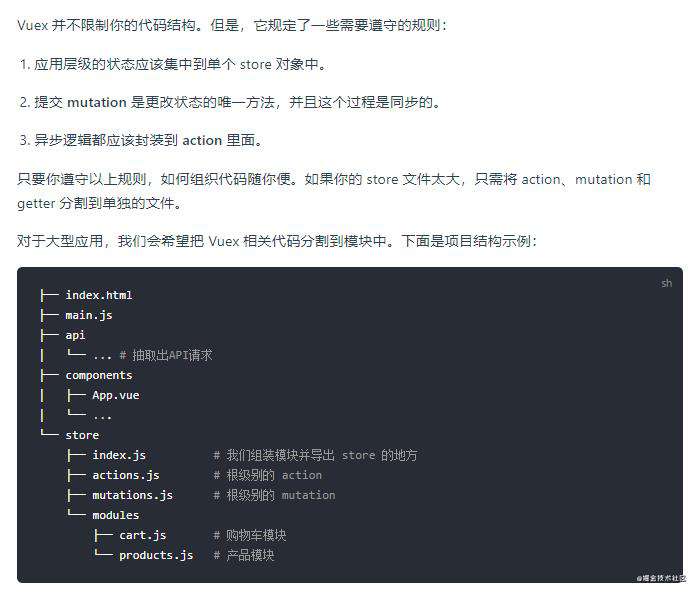总结官方文档中的内容,方便自己看
介绍
专为vue.js开发的状态管理模式,把不同组件的共享状态抽取出来,以一个全局单例模式管理
npm
npm install vuex --save
安装
import Vue from 'vue'
import Vuex from 'vuex'
Vue.use(Vuex)
store(仓库)
基本就是一个容器,它包含着你的应用中大部分的状态(state)。
vuex和单纯的全局对象有以下两点不同:
1.Vuex的状态存储是响应式的。store中的状态改变,组件中也会更新。
2.不能直接改变store中的状态。【应该提交mutation】
创建Store
import Vue from 'vue'
import Vuex from 'vuex'
Vue.use(Vuex)
const store = new Vuex.Store({
state: {
count: 0
},
mutations: {
increment (state) {
state.count++
}
}
})
使用
store.state 获取状态对象,通过
store.commit方法触发状态变更
store.commit('increment')
console.log(store.state.count) // -> 1
为了在Vue组件中访问
this.$store
property,需要为Vue实例提供创建好的store,需要在根组件注入store机制:
new Vue({
el: '#app',
store: store,
})
然后可以从组件的方法提交一个变更:
methods: {
increment() {
this.$store.commit('increment')
console.log(this.$store.state.count)
}
}
核心概念
State
单一状态树,用一个对象就包含了全部的应用层级状态,每当 ` store.state.count ` 变化的时候, 都会重新求取计算属性,并且触发更新相关联的 DOM。
mapState 辅助函数
当一个组件需要获取多个状态的时候,将这些状态都声明为计算属性会有些复杂和冗余,这时可以使用mapState辅助函数帮助生成计算属性,可以帮助我们少按几次键
import { mapState } from "vuex";
computed: {
// 使用对象展开运算符将此对象混入到外部对象中
...mapState(["count", "data01"]),
}
//使用
console.log("count", this.count);
Getters
vueX允许我们在store中定义“getter”(可以认为是store中的计算属性)。有缓存,只有依赖值发生变化才会重新计算
Getter 接受 state 作为其第一个参数:
const store = new Vuex.Store({
state: {
todos: [
{ id: 1, text: '...', done: true },
{ id: 2, text: '...', done: false }
]
},
getters: {
doneTodos: state => {
return state.todos.filter(todo => todo.done)
}
}
})
通过属性访问
Getter 会暴露为 store.getters 对象,你可以以属性的形式访问这些值:
store.getters.doneTodos // -> [{ id: 1, text: '...', done: true }]
Getter 也可以接受其他 getter 作为第二个参数:
getters: {
// ...
doneTodosCount: (state, getters) => {
return getters.doneTodos.length
}
}
通过方法访问
可以通过让 getter 返回一个函数,来实现给 getter 传参。
getters: {
// ...
getTodoById: (state) => (id) => {
return state.todos.find(todo => todo.id === id)
}
}
store.getters.getTodoById(2) // -> { id: 2, text: '...', done: false }
注意,getter 在通过方法访问时,每次都会去进行调用,而不会缓存结果。
mapGetters 辅助函数
mapGetters 辅助函数仅仅是将 store 中的 getter 映射到局部计算属性
import { mapGetters } from 'vuex'
export default {
// ...
computed: {
// 使用对象展开运算符将 getter 混入 computed 对象中
...mapGetters([
"doneTodos",
"doneTodosCount",
// ...
])
}
}
//使用时
console.log("getter", this.doneTodos);
如果你想将一个 getter 属性另取一个名字,使用对象形式:
...mapGetters({
// 把 `this.doneCount` 映射为 `this.$store.getters.doneTodosCount`
doneCount: 'doneTodosCount'
})
Mutations
更改Vuex的store中的状态的唯一方法是提交mutation。【提交mutation可以方便管理,直接修改state中的状态过于分散,不好管理】
store中mutation进行修改状态
const store = new Vuex.Store({
state: {
count: 1
},
mutations: {
increment (state) {
// 变更状态
state.count++
}
}
})
组件中调用
store.coommit 方法:
store.commit('increment')
提交载荷(Payload)
你可以向 store.commit 传入额外的参数,即 mutation 的 载荷(payload):
// ...
mutations: {
increment (state, n) {
state.count += n
}
}
store.commit('increment', 10)
在大多数情况下,载荷应该是一个对象,这样可以包含多个字段并且记录的 mutation 会更易读:
mutations: {
increment (state, payload) {
state.count += payload.amount
}
}
store.commit('increment', {
amount: 10
})
对象风格的提交方式
提交 mutation 的另一种方式是直接使用包含 type 属性的对象:
store.commit({
type: 'increment',
amount: 10
})
mutations: {
increment (state, payload) {
state.count += payload.amount
}
}
Mutation需遵守Vue的响应规则
注意事项:
1.最好提前在你的 store 中初始化好所有所需属性。
2.当需要在对象上添加新属性时,应该
*使用Vue.set(obj,'newProp',123)或者
*以新对象替换老对象。例如,利用对象展开运算符:
state.obj = {...state.obj,newProp:123}
3.Mutation必须是同步函数
在组件中提交 Mutation
你可以在组件中使用 this.$store.commit('xxx') 提交 mutation,或者使用 mapMutations 辅助函数将组件中的 methods 映射为 store.commit 调用(需要在根节点注入 store)。
import { mapMutations } from 'vuex'
export default {
// ...
methods: {
...mapMutations([
'increment', // 将 `this.increment()` 映射为 `this.$store.commit('increment')`
// `mapMutations` 也支持载荷:
'incrementBy' // 将 `this.incrementBy(amount)` 映射为 `this.$store.commit('incrementBy', amount)`
]),
...mapMutations({
add: 'increment' // 将 `this.add()` 映射为 `this.$store.commit('increment')`
})
}
}
Mutation都是同步事务 处理异步操作看Action
Actions
Action函数接受一个与store实例具有相同方法和属性的context对象,因此你可以调用context.commit提交一个mutation,或者通过context.state和context.getters来获取state和getters。
Actions类似于mutation,不同在于:
- Action提交的是mutation,而不是直接变更状态。
- Action可以包含任意异步操作
分发Action
Action通过store.dispatch方法触发
store.dispatch('increment')
// 以载荷形式分发
store.dispath('incrementAsync',{
amount: 10
})
// 以对象形式分发
store.dispatch({
type: 'incrementAsync',
amount: 10
})
//可以在action内部执行异步操作
action: {
incrementAsync ({ commit }) {
setTimeout(() => {
commit('increment')
}, 1000)
}
}
在组件中分发Action
在组件中使用 this.$store.dispatch('xxx') 分发 action,或者使用 mapActions 辅助函数将组件的 methods 映射为 store.dispatch 调用(需要先在根节点注入 store):
import { mapActions } from 'vuex'
export default {
// ...
methods: {
...mapActions([
'increment', // 将 `this.increment()` 映射为 `this.$store.dispatch('increment')`
// `mapActions` 也支持载荷:
'incrementBy' // 将 `this.incrementBy(amount)` 映射为 `this.$store.dispatch('incrementBy', amount)`
]),
...mapActions({
add: 'increment' // 将 `this.add()` 映射为 `this.$store.dispatch('increment')`
})
}
}
组合Action
Action 通常是异步的,那么如何知道 action 什么时候结束呢?更重要的是,我们如何才能组合多个 action,以处理更加复杂的异步流程?
首先,你需要明白 store.dispatch 可以处理被触发的 action 的处理函数返回的 Promise,并且 store.dispatch 仍旧返回 Promise:
actions: {
actionA ({ commit }) {
return new Promise((resolve, reject) => {
setTimeout(() => {
commit('someMutation')
resolve()
}, 1000)
})
}
}
现在可以:
store.dispatch('actionA').then(() => {
// ...
})
在另外一个 action 中也可以:
actions: {
// ...
actionB ({ dispatch, commit }) {
return dispatch('actionA').then(() => {
commit('someOtherMutation')
})
}
}
最后,如果我们利用 async / await (opens new window),我们可以如下组合 action:
// 假设 getData() 和 getOtherData() 返回的是 Promise
actions: {
async actionA ({ commit }) {
commit('gotData', await getData())
},
async actionB ({ dispatch, commit }) {
await dispatch('actionA') // 等待 actionA 完成
commit('gotOtherData', await getOtherData())
}
}
一个 store.dispatch 在不同模块中可以触发多个 action 函数。在这种情况下,只有当所有触发函数完成后,返回的 Promise 才会执行。
Module
由于使用单一状态树,应用的所有状态会集中到一个比较大的对象。当应用变得非常复杂时,store 对象就有可能变得相当臃肿。
为了解决以上问题,Vuex 允许我们将 store 分割成模块(module)。每个模块拥有自己的 state、mutation、action、getter、甚至是嵌套子模块——从上至下进行同样方式的分割:
const moduleA = {
state: () => ({ ... }),
mutations: { ... },
actions: { ... },
getters: { ... }
}
const moduleB = {
state: () => ({ ... }),
mutations: { ... },
actions: { ... }
}
const store = new Vuex.Store({
modules: {
a: moduleA,
b: moduleB
}
})
store.state.a // -> moduleA 的状态
store.state.b // -> moduleB 的状态
项目结构

常见问题FAQ
- 免费下载或者VIP会员专享资源能否直接商用?
- 本站所有资源版权均属于原作者所有,这里所提供资源均只能用于参考学习用,请勿直接商用。若由于商用引起版权纠纷,一切责任均由使用者承担。更多说明请参考 VIP介绍。
- 提示下载完但解压或打开不了?
- 找不到素材资源介绍文章里的示例图片?
- 模板不会安装或需要功能定制以及二次开发?




发表评论
还没有评论,快来抢沙发吧!